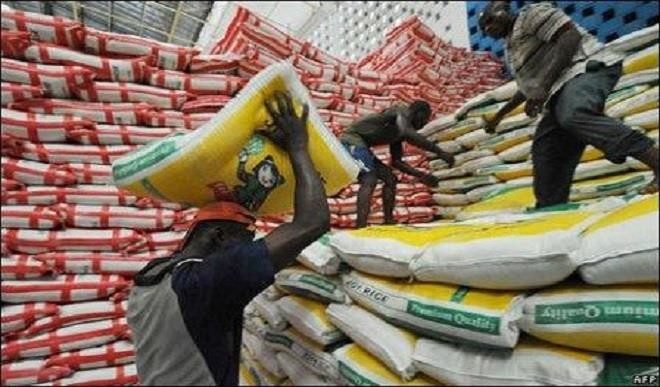Must Nigeria continue to rely on food importation?
There is no doubt that our nation’s overdependence on food importation despite the availability of large cultivable expanse of fertile land spread across the 36 states and the Federal Capital Territory has not only punctured the authenticity of our country’s sovereignty as a truly independent state but the development has further put a big question […]

File photo: Imported rice

There is no doubt that our nation’s overdependence on food importation despite the availability of large cultivable expanse of fertile land spread across the 36 states and the Federal Capital Territory has not only punctured the authenticity of our country’s sovereignty as a truly independent state but the development has further put a big question mark on the claim of Nigeria as the giant of the African continent incognito.
Unfortunately the situation is not being helped through the feeding of the public with biased and politically motivated lurid newspaper headlines, editorials, disobliging interviews and comments by highly placed persons in the society during which focus and emphasis had been only on the hardship being experienced in the country arising from the Federal Government’s ban of some food items, notably rice.
I think we should tell the populace the home truth about the bandwagon effects of not giving maximum attention to agriculture. Let us collectively imagine a situation whereby Nigeria’s ludicrous $22b yearly food imports is no longer sustainable by the Federal Government.
At this juncture the million Naira question we should be asking ourselves as a sovereign nation is: Don’t we have all it takes to stop the unnecessary wastage of foreign reserves on food imports in the face of the present era of economic recession in our country and can’t we sufficiently feed ourselves without dependence on food importation? To be sincere to ourselves, the answer should be an emphatic YES. Nigeria, as revealed in a programme on agriculture on the Channels TV, made us to know that our country is blessed with 98,000 hectares of cultivable fertile lands but out of this figure, the entire cultivated land is around 30,000 hectares leaving a balance of a whopping 68,000 hectares lying fallow. This apart, from findings, the total length of the 10 longest rivers in Nigeria is put at 5,759.2 kms. The breakdown is as follows: Niger 1174.6, Benue 796, Sokoto 627.5, Kaduna 547, Cross River 539, Gongola 530.9, Komadugu Yobe 466.6, Ka 378, Yedseram 353.9 and Katsina-Ala 345.7. Mention must be made that outside these 10 rivers, there is hardly any state where a river does not pass through with examples such as Ogun river in Ogun state, Osun river in Osun state, just to mention a few but the extent to which all rivers in the country have been put to effective use for development of agriculture is an area that calls for examination and frank evaluation.
Come to think of it, the palm kernel seeds that turned Malaysia today as the world’s largest producer and exporter of palm oil were taken away from Nigeria but today Nigeria is one of the countries importing palm oil from Malaysia for survival. What an irony!
Without mincing words, the ongoing serious attention given to agriculture as a means of diversification remains the panacea for achievement of a stable and robust economy.
Odunayo Joseph, Mopa, Kogi State
